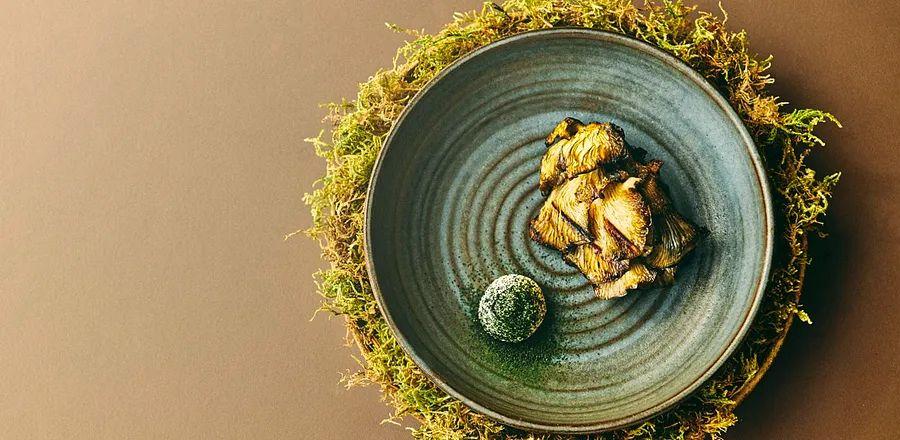A Journey from Dawn to Dusk at the ‘Noma’ of Vegan Dining

In a hidden beach foraging location on the outskirts of Copenhagen, I’m with Jason Renwick, founder and CEO of the Ark Collection, a conscious dining group in Denmark. As we stroll through the greenery toward the coast, Renwick highlights sea buckthorn, rose hips, fireweed, elderberry, beach mustard, goosefoot (wild spinach), and sea sandwort. The shrubs are adorned with red, black, and vibrant yellow-orange berries, while flowering plants with magenta and violet blooms stand out in the lush surroundings. “It’s just free food everywhere,” he notes. Renwick, mentored by the former head forager of the 2021 world’s-best restaurant, Noma, Christina Rasmussen, dedicates around 20 hours each week to collecting beach and forest treasures for his restaurants. Noma foragers often visit this area, creating competition. “Noma actually beat me to this spot this year,” he shares.
In 2021, Ark, the Ark Collection’s plant-based fine dining establishment, made history as the first vegan restaurant in the Nordics to receive a Michelin Green Star for its sustainable practices and innovations in plant-based cuisine; it was awarded again in 2022. The progression of the Ark Collection—starting with Souls, followed by Ark, and then Bistro Lupa—showcases a dedication to contemporary plant-based cuisine with a conscience.
Ark is not alone in its mission: Across the globe, restaurants are embracing sustainability. Named the number one restaurant in the world in 2022, Copenhagen’s three-Michelin-starred Geranium eliminated meat from its menu at the start of 2022, although it still offers seafood for discerning pescatarians. Eleven Madison Park famously adopted a vegan menu in 2021, a move chef Daniel Humm envisioned as a way to influence the future of fine dining. “I believe the culinary world is where we can create the most change by altering our eating habits,” Renwick asserts. “A restaurant like Eleven Madison Park doing that is monumental.”

Photo credit: Jenia Nelisova
Although Renwick exclusively opened vegan restaurants, he isn't strictly vegan himself; he initially intended to launch a steakhouse. However, just five months before opening Souls Steakhouse in 2016, he watched Cowspiracy: The Sustainability Secret (2014) and Earthlings, a 2005 documentary exploring humanity's treatment of animals, which led him to pivot from a steakhouse concept to a casual vegan eatery. “I was in tears halfway through [Earthlings] and realized I couldn’t proceed with a steakhouse—I had to create a vegan restaurant. And I had no prior experience with vegan food,” he recalls.
The original Souls, known for its vegan burgers and salads, was a hit, but Renwick aspired for fine dining. “I aimed to demonstrate that plant-based fine dining could rival any traditional restaurant,” he shares. In November 2019, he brought on English chef Brett Lavender, who found the challenge of plant-based fine dining intriguing after years in conventional kitchens. During the lockdown, Lavender was able to refine his skills and experiment before Ark launched in August 2020, quickly gaining acclaim.
In mid-September 2020, the Danish newspaper Politiken awarded Ark five hearts, leading to packed crowds. When the second lockdown hit, Renwick chose to close Souls and opened Bistro Lupa in its place. Their hard work during the pandemic paid off: Politiken granted Bistro Lupa an exceptional six hearts in 2022, a rare accolade.
The night before, I enjoyed the tasting menu at Bistro Lupa, which included “LFM” (Lupa Fried Mushroom)—a coral tooth mushroom fried Southern style, drizzled with a smoked chile glaze made from tomato, tamarind, and a blend of 15 spices. The mushroom, sliced to resemble fried chicken, was packed with umami. My standout dish, “Corn on the Cob,” was topped with truffle aioli (featuring black summer truffle) and crushed popcorn, accented with tarragon and Espelette pepper, a mild Basque chile that added the perfect kick.
Mushrooms—described by Renwick as “the ideal meat substitute”—are at the forefront of Bistro Lupa and Ark; they also boast a minimal environmental impact, which is central to Ark’s mission. Last year, Renwick partnered with mushroom cultivator Thomas Kyle Cometta to establish Funga Farm 2.0 in collaboration with the Danish brewery Brøl, utilizing spent brewer’s grain as a nutrient source for mushroom cultivation. “For them, it’s a waste product. For us, it’s treasure,” Cometta notes.
Mushrooms typically feature prominently on Ark’s tasting menu, but due to the move to Funga Farm 2.0, they were absent from my meal. Later that evening, I was delighted to see some of our foraged ingredients beautifully presented on Ark’s plates, including “Blue Plate,” Lavender’s interpretation of Pommes Anna, which layers potatoes, fermented kohlrabi trimmings, miso hollandaise, and a blend of hemp, pumpkin, and sunflower seeds, topped with foraged beach herbs. It was almost too stunning to eat.
Another highlight, “Black Plate,” pays homage to Lavender’s English roots. A fresh sourdough crumpet is topped with smoked ricotta and Danish green beans, dressed with a champagne vinaigrette and accompanied by a medley of herbs from an organic, sustainable Danish farm located about an hour from Copenhagen. The ricotta, crafted from unsweetened soy milk, follows traditional methods and is smoked over foraged pine or juniper branches. As a dairy enthusiast, I usually miss butter and cheese, but I found myself satisfied without them.
The final dessert, “White Bowl,” celebrated the last of the season’s rhubarb and strawberries—the table next to me praised it highly, and it certainly lived up to the hype. Crunchy, buttery shortbread crumble paired wonderfully with crème anglaise made from lentil cream and oat milk, along with red and green Danish strawberries, finished with a sorbet of rhubarb and soy whey, and garnished with foraged corn flowers. (The soy whey was a byproduct of the ricotta-making process, exemplifying the collection’s dedication to minimizing waste.) I nearly considered licking the bowl clean.

Photo credit: Christoffer Rosenfeldt
Ark’s bar also embodies a “zero waste” approach, with nearly everything crafted in-house, from repurposing wine, tea, and coffee grounds into homemade liqueurs and vermouths to fermenting acids that enhance the drinks. Instead of using citrus, the bar employs fermented beverages like kombucha and kaffir remnants to add acidity typically provided by lemons. This sustainable mindset permeates the entire establishment: lights are crafted from seaweed, wooden floors are sourced from a nearby forest, and vegan glue binds the dining chairs. As Renwick emphasizes: “We truly live and breathe sustainability.”
Evaluation :
5/5



